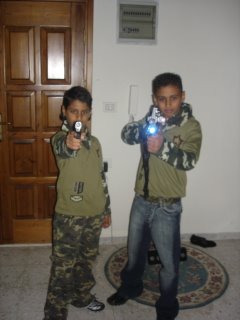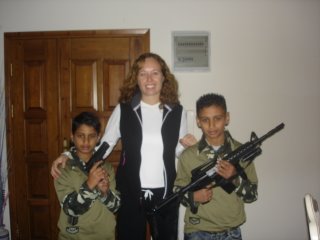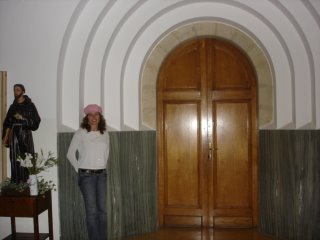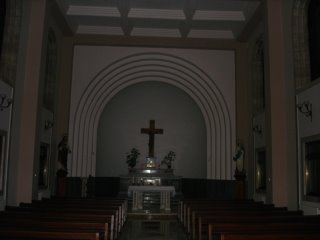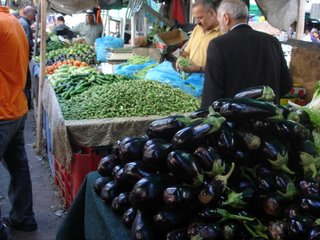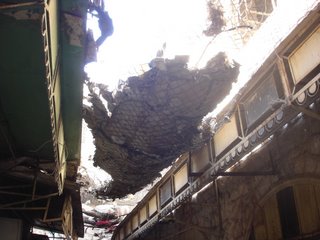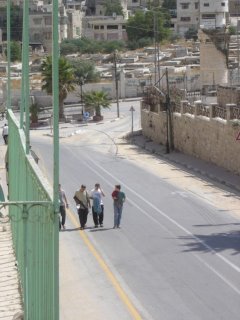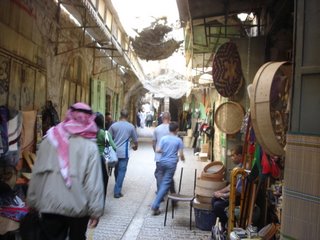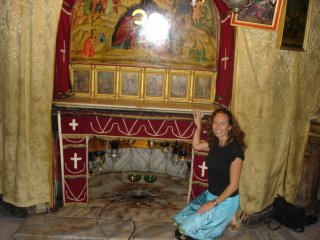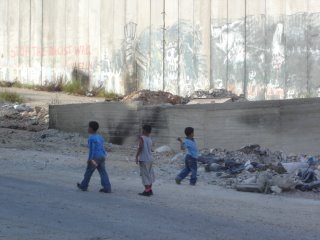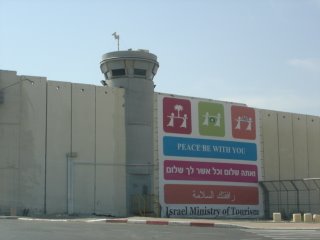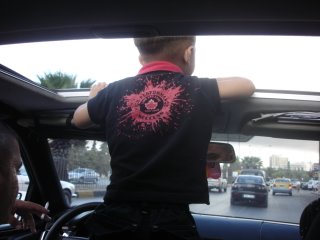
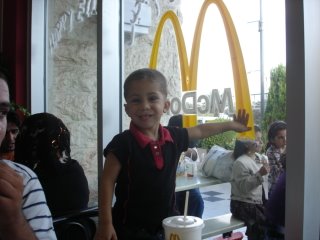
Life in the big city again!
The lights, tall buildings, malls, (Mecca Mall is a popular mall here in Amman), McDonalds of course, and even Starbucks. I'm feeling civilized; it's great to be back in Amman. The last time I was here was on my way home from Baghdad in July 2005, but it doesn't feel like much time has passed at all.
Getting here from the West Bank was an experience in itself. I left my house in Birzeit at 7:45 am on the 24th with no clue how I would actually get to Amman. I knew that since I didn't have a Jordanian visa I couldn't go through the border crossing that was closest to the West Bank (King Hussein bridge) and instead had to go to one of the "real" border crossings between Israel and Jordan. But I didn't know how I would do that.
I started with the bus (servees) to Ramallah. In Ramallah, I started walking to the bus station in Ramallah to go to Jerusalem, thinking that it would be easier to find a bus to the North from there and stopped to ask a taxi driver what he thought. The taxi driver said there are no direct buses from Jerusalem to the border crossing and that the best way was to go by private taxi. (hmm, not surprising...this option would certainly be better for him!) Despite his ulterior motives, I happened to agree with him that taking the bus into Jerusalem (which was actually going the wrong direction from where I needed to go), hoping that there was some kind of bus, and if not, paying the much more expensive Israeli taxi fare was more than I wanted to deal with that morning. So, I agreed to pay him the 200 shekels to drive me North and we set off. It ended up being much longer than I thought, maybe an hour and a half of driving, winding down towards Jericho and the Dead Sea and then through picturesque valleys with mountains rising on all sides...desert mountains with very little foliage, but mountains nevertheless. I pretended like I was napping most of the time to fend off the driver's flirtations (despite his having a wife and three kids), and enjoyed the long, windy drive North. After a while, we stopped at an Israeli checkpoint and my driver said, "Okay, they'll take care of you from here. I can't go any farther," took out my backpack, and showed me the door. "Excuse me? Who will take care of me? Where are we?" It turns out we were about 30 miles from the Shaykh Hussein border crossing, but because the rest of the way happened to be in Israel, not the West Bank, he had to turn back at the checkpoint. So, I got out, walked through the checkpoint, and asked the Israeli guards what I should do. "Well, you can wait for a taxi to take you to the nearest town, Beet Sha'anan, but just so you know, there probably won't be any." "Ah," I replied. "So what should I do?" They just shrugged. So, I took my stuff over to the side of the road and sat down to think. It was 9:30 am and there were no cars at all coming and I still had so much of my journey left to go!
After about ten minutes, a pick-up truck drove through and as the guards were searching it, one of them ran over to me, double-checked my passport, and said, "Do you want to go with this guy? He's driving to the next town." I didn't hesitate, mainly glad to get somewhere besides the checkpoint and just slightly bemused at the idea of my first experience hitch-hiking being in the hinterlands of Israel. I climbed in next to a guy who looked like the Israeli equivalent to a farmer on the backroads of Idaho, with his pick-up truck, country-western style music in Hebrew blaring, and tanned arms and face. He spoke only a few English words so we rode along listening to the Hebrew country music and enjoyed the scenery. At the next town, he dropped me off at a somewhat-central looking square and I thanked him profusely. I went into a falafel stand and asked them if they had any idea about how to get to the Shaykh Hussein border crossing, at this point only 5 miles away. You would have thought I was asking how to get to Mars. Finally, the woman agreed to call me a taxi and I could ask him. Twenty minutes later, the taxi drive pulled up and agreed to take me for 30 shekels, about 7 dollars. I tried haggling with him, but I think he knew the options were clearly limited, so he didn't budge. 5 minutes later, I was at the border and walked towards a tall, airport-looking building that was the Israeli immigration side. I elbowed my way to the counter after about 30 minutes (no such thing as a line of course) and paid the $25 dollar exit tax.
Then, I left the building and got onto a special bus that you have to pay another dollar to take you to the Jordanian side of the immigration. Little did I know what i was in for!! the Jordanian building was so packed with people you could barely walk in it. I shoved my way over towards the mob assembled in front of the visa counters and my heart sank. There was a huge mass of men (only two women that I could see) pushing and screaming and shoving to get the attention of the people at the two visa counters. It was INSANE. The only other time I've seen a crowd like that was in Gambia, West Africa trying to get into a Youssou N'Dour concert, and at which I was nearly stampeded to death. I had hands down my pants, up my shirt, my money stolen, was on the ground at one point with people stepping on me, and then to top it off, was clubbed on the head by a policeman who was beating back the crowd and didn't see the lone, poor, American woman in the midst of it.
As that memory came flooding back to me, I entered the foray with some trepidation. After a good twenty minutes with absolutely no progress or movement forward, (in fact, I think I was pushed backwards), I went over to a policeman who was trying to get some control over the mob and asked if he had any suggestions for what I could do to get a visa. No, he had not. Hmmm,so I tried again and this time made it slightly closer to the front and then realized that the 30 or so people in front of me each had stacks of about 10 passports. I realized it was a hopeless cause and looked in desperation at a guy who was very close to the front and who was already holding a stack of 10. I sized him up quickly, trying to decide if he looked the type to make off with my passport if I gave it to him. I decided he looked okay. "Can I give mine to you too?" I asked. "No problem," he answered. I gratefully elbowed my way out of line and sat on the outskirts to wait...and wait...and wait.
It took at least another hour for him to get to the front and for them to process the 22 visas that he had accumulated by the time he got up there. By the time he got out, he was drenched in sweat and downed an entire bottle of water in one gulp that his wife handed him. I started chatting with his wife and playing with their child while we were waiting in yet another line to get an entry stamp now that we had the visas. It turns out they were Israei Arabs living near Haifa and were going to Jordan on vacation for the Eid holiday. The wife wore a headscarf, but was dressed up in jewelry and high heels. She was about to turn 23 and had been married for three years already. (Seriously, I'm starting to get an old maid complex!) While waiting in line, they asked me how I was getting to Amman. I replied that I had no idea; I figured I would catch a bus or get a servees. They insisted that I ride with them since they were driving and had an extra spot in their car.
So, the adventure continued...waiting in yet another line to get the car through another processing line, in which they charge you an exorbitant $100 and make you switch the plates from Israeli to Jordanian. Finally, we started off for the 2 hour drive down to Amman. A very friendly couple, we chatted about life in Israel for them and they wanted to hear all about life in the West Bank, since they had only been there a few times. (They said it was too dangerous for them to go. Huh?) The wife cleared up for me the situation about the school segregration. (Recall my confusion in an earlier blog.) Yes, indeed, they are all separated between Jews and Arabs, but Arabs are taught Hebrew in school along with Arabic. However, Jews are not taught Arabic. Hence, the reason why all Israeli Arabs speak Hebrew.
All the time chatting, I was of course riding in the back seat with their 2 and a half year old who did not have a car seat and was climbing all over me and beating me over the head once in a while. Maybe he was excited because they had given him nothing but coke and candy to eat in the two hours I had been with them. They also regularly played a song he liked at crushing decibels and he would dance to it. I literally had to plug my ears it was so loud; I can't imagine what the volume was doing to the little guy's ears! The worst part is they would open the sunroof and he would climb up on the middle console and stick his head out the top and dance. They would laugh and say, "Isn't this great? This is illegal to do in Israel, but here there's no problem!" "Riiight," I thought, no problem when the Dad is driving 80 mph in his Mercedes on windy roads passing trucks and cars on hairpin turns. So, so much for car and child safety.
Then, there was a not so delightful temper tantrum, during which I was kicked many more times. I'll spare you the details. The experience proved to be interesting in a later conversation with my American friend in Amman whose background is in childhood development. She was lamenting how little Arab parents know about disciplining kids properly--the children (especially middle to upper class) are generally quite spoiled and that the main way parents in Jordan know to discipline their kids is through hitting.
Finally, we made it to Amman and they wanted to head straight to McDonalds. I never eat McDonalds in a foreign country, but I figured since I was with an Arab family, it was more forgivable. We were probably quite a sight sitting there together eating our Big Macs, but I've certainly been in stranger situations.
I finally made it to my friends' house at around 6:30 pm (nearly 11 hours after leaving), friends of mine from Principia College who are posted in Amman for three years at the Embassy. I reveled in a yummy dinner including sweet potatoes (yum!), a comfortable bed, real American cereal, a washer AND drier, and a shower with water pressure. Life is good in civilization!

